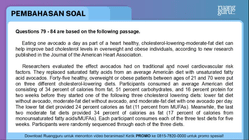Iklan
Pertanyaan
Questions 79 - 84 are based on the following passage.
Eating one avocado a day as part of a heart healthy, cholesterol-lowering-moderate-fat diet can help improve bad cholesterol levels in overweight and obese individuals, according to new research published in the Journal of the American Heart Association.
Researchers evaluated the effect avocados had on traditional and novel cardiovascular risk factors. They replaced saturated fatty acids from an average American diet with unsaturated fatty acid avocados. Forty-five healthy, overweight or obese patients between ages of 21 and 70 were put on three different cholesterol-lowering diets. Participants consumed an average American diet consisting of 34 percent of calories from fat, 51 percent carbohydrates, and 16 percent protein for two weeks before they started one of the following three cholesterol lowering diets: lower fat diet without avocado, moderate-fat diet without avocado, and moderate-fat diet with one avocado per day. The lower fat diet provided 24 percent calories as fat (11 percent from MUFAs). Meanwhile, the last two moderate fat diets provided 34 percent of calories as fat (17 percent of calories from monounsaturated fatty acids/MUFAs). Each participant consumes each of the three test diets for five weeks. Participants were randomly sequenced through each of the three diets.
Researchers found that, compared to the baseline average American diet, low-density lipoprotein (LDL)-the so called 'bad cholesterol'-was 13.5 mg/dl lower after consuming the moderate fat diet that included an avocado. LDL was also lower on the moderate fat diet without the avocado (8.3 mg/dL lower) and the lower fat diet (7.4 mg/dl lower), although the results were not as striking as the avocado diet. In addition, several additional blood measurements were also more favorable after the avocado diet versus the other cholesterol-lowering diets as well.
The measurements are all considered to be cardio-metabolic risk factors in ways that are independent of the heart-healthy fatty acid effects, said a distinguished professor at Pennsylvania State University. "This was a controlled feeding study, but not the real-world. So, it is a proof-ofconcept investigation:We need to focus on getting people to eat a heart-healthy diet that includes avocados and other nutrient-rich food sources of better fats."
"In the United States avocados are not a mainstream food yet. They can be expensive, especially at certain times of year. Also, most people do not really know how to incorporate them in their diet except for making guacamole. Guacamole is typically eaten with corn chips, which are high in calories and sodium. Avocados, however, can also be eaten with salads, vegetables, sandwiches,and lean protein foods like chicken or fish or even whole."
In addition to MUFAs, avocados also provide other bioactive components that could have contributed to the finding as fiber, phytosterols, and other compounds. The Mediterranean diet includes fruits, vegetables, whole grains, fatty fish, and food rich in monounsaturated fatty acids-like extra-virgin olive oil and nuts. Like avocados, some research indicates that these contain not only better fats but also certain micronutrients and bioactive components that may play an important role in reducing risk of heart disease.
(Adapted from: http://sciencedaily.com)
In relation to paragraph 2, what does paragraph 3 inform?
In relation to paragraph 2, what does paragraph 3 inform?
Procedures in carrying out the research.
Results of the treatment described in paragraph 2.
Cholesterol contents that are cussed in paragraph 2.
Conditions of the respondents when applying the diets.
Relationships between the diets and cholesterol contents.
Iklan
A. Mufida
Master Teacher
2
0.0 (0 rating)
Iklan
RUANGGURU HQ
Jl. Dr. Saharjo No.161, Manggarai Selatan, Tebet, Kota Jakarta Selatan, Daerah Khusus Ibukota Jakarta 12860
Produk Ruangguru
Bantuan & Panduan
Hubungi Kami
©2026 Ruangguru. All Rights Reserved PT. Ruang Raya Indonesia

















